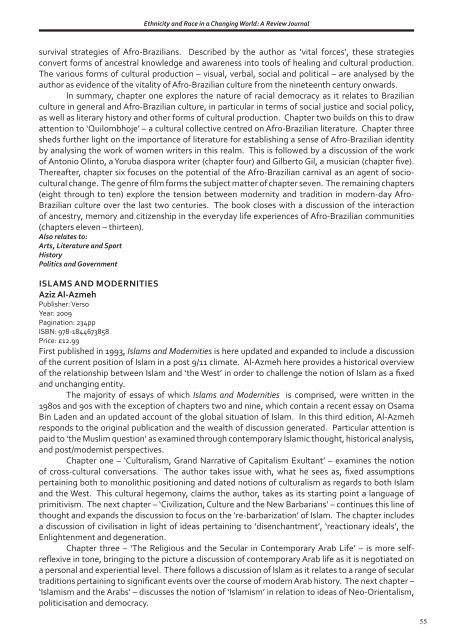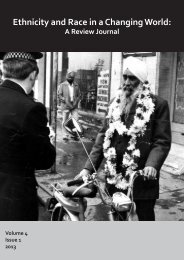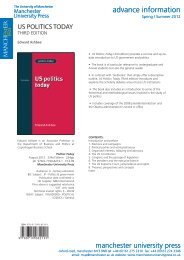Ethnicity and Race in a Changing World
Volume 2, Issue 1, 2010 - Manchester University Press
Volume 2, Issue 1, 2010 - Manchester University Press
- No tags were found...
Create successful ePaper yourself
Turn your PDF publications into a flip-book with our unique Google optimized e-Paper software.
<strong>Ethnicity</strong> <strong>and</strong> <strong>Race</strong> <strong>in</strong> a Chang<strong>in</strong>g <strong>World</strong>: A Review Journalsurvival strategies of Afro-Brazilians. Described by the author as ‘vital forces’, these strategiesconvert forms of ancestral knowledge <strong>and</strong> awareness <strong>in</strong>to tools of heal<strong>in</strong>g <strong>and</strong> cultural production.The various forms of cultural production – visual, verbal, social <strong>and</strong> political – are analysed by theauthor as evidence of the vitality of Afro-Brazilian culture from the n<strong>in</strong>eteenth century onwards.In summary, chapter one explores the nature of racial democracy as it relates to Brazilianculture <strong>in</strong> general <strong>and</strong> Afro-Brazilian culture, <strong>in</strong> particular <strong>in</strong> terms of social justice <strong>and</strong> social policy,as well as literary history <strong>and</strong> other forms of cultural production. Chapter two builds on this to drawattention to ‘Quilombhoje’ – a cultural collective centred on Afro-Brazilian literature. Chapter threesheds further light on the importance of literature for establish<strong>in</strong>g a sense of Afro-Brazilian identityby analys<strong>in</strong>g the work of women writers <strong>in</strong> this realm. This is followed by a discussion of the workof Antonio Ol<strong>in</strong>to, a Yoruba diaspora writer (chapter four) <strong>and</strong> Gilberto Gil, a musician (chapter five).Thereafter, chapter six focuses on the potential of the Afro-Brazilian carnival as an agent of socioculturalchange. The genre of film forms the subject matter of chapter seven. The rema<strong>in</strong><strong>in</strong>g chapters(eight through to ten) explore the tension between modernity <strong>and</strong> tradition <strong>in</strong> modern-day Afro-Brazilian culture over the last two centuries. The book closes with a discussion of the <strong>in</strong>teractionof ancestry, memory <strong>and</strong> citizenship <strong>in</strong> the everyday life experiences of Afro-Brazilian communities(chapters eleven – thirteen).Also relates to:Arts, Literature <strong>and</strong> SportHistoryPolitics <strong>and</strong> GovernmentISLAMS AND MODERNITIESAziz Al-AzmehPublisher: VersoYear: 2009Pag<strong>in</strong>ation: 234ppISBN: 978-1844673858Price: £12.99First published <strong>in</strong> 1993, Islams <strong>and</strong> Modernities is here updated <strong>and</strong> exp<strong>and</strong>ed to <strong>in</strong>clude a discussionof the current position of Islam <strong>in</strong> a post 9/11 climate. Al-Azmeh here provides a historical overviewof the relationship between Islam <strong>and</strong> ‘the West’ <strong>in</strong> order to challenge the notion of Islam as a fixed<strong>and</strong> unchang<strong>in</strong>g entity.The majority of essays of which Islams <strong>and</strong> Modernities is comprised, were written <strong>in</strong> the1980s <strong>and</strong> 90s with the exception of chapters two <strong>and</strong> n<strong>in</strong>e, which conta<strong>in</strong> a recent essay on OsamaB<strong>in</strong> Laden <strong>and</strong> an updated account of the global situation of Islam. In this third edition, Al-Azmehresponds to the orig<strong>in</strong>al publication <strong>and</strong> the wealth of discussion generated. Particular attention ispaid to ‘the Muslim question’ as exam<strong>in</strong>ed through contemporary Islamic thought, historical analysis,<strong>and</strong> post/modernist perspectives.Chapter one – ‘Culturalism, Gr<strong>and</strong> Narrative of Capitalism Exultant’ – exam<strong>in</strong>es the notionof cross-cultural conversations. The author takes issue with, what he sees as, fixed assumptionsperta<strong>in</strong><strong>in</strong>g both to monolithic position<strong>in</strong>g <strong>and</strong> dated notions of culturalism as regards to both Islam<strong>and</strong> the West. This cultural hegemony, claims the author, takes as its start<strong>in</strong>g po<strong>in</strong>t a language ofprimitivism. The next chapter – ‘Civilization, Culture <strong>and</strong> the New Barbarians’ – cont<strong>in</strong>ues this l<strong>in</strong>e ofthought <strong>and</strong> exp<strong>and</strong>s the discussion to focus on the ‘re-barbarization’ of Islam. The chapter <strong>in</strong>cludesa discussion of civilisation <strong>in</strong> light of ideas perta<strong>in</strong><strong>in</strong>g to ‘disenchantment’, ‘reactionary ideals’, theEnlightenment <strong>and</strong> degeneration.Chapter three – ‘The Religious <strong>and</strong> the Secular <strong>in</strong> Contemporary Arab Life’ – is more selfreflexive<strong>in</strong> tone, br<strong>in</strong>g<strong>in</strong>g to the picture a discussion of contemporary Arab life as it is negotiated ona personal <strong>and</strong> experiential level. There follows a discussion of Islam as it relates to a range of seculartraditions perta<strong>in</strong><strong>in</strong>g to significant events over the course of modern Arab history. The next chapter –‘Islamism <strong>and</strong> the Arabs’ – discusses the notion of ‘Islamism’ <strong>in</strong> relation to ideas of Neo-Orientalism,politicisation <strong>and</strong> democracy.55






